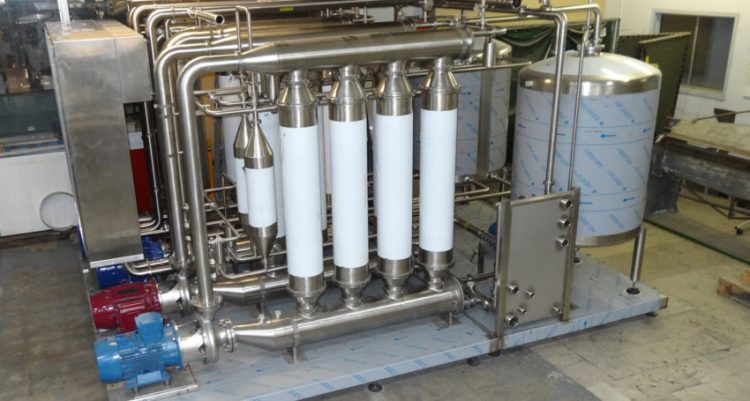Titanium filtration membranes that extract maximum solids with minimal cleaning have been launched commercially in South Australia.
Adelaide-based Advanced Material Solutions (AMS) began commissioning its first commercial units last month and plans to ramp up its workforce from 26 to more than 200 to cater for burgeoning global demand.
Managing Director Gilbert Erskine said the titanium membranes, which can extract solids up to 80 per cent, were so strong that they could run 24-hours a day for a week. Polymeric (plastic) or ceramic filters, which have extraction limits of around 10 per cent, could spend 30 per cent of their time in cleaning modes, which often included chemicals.
He said his Viti-flow membrane could be easily cleaned in minutes with steam or hot water up to 90C.
“We have the ability to change that micron and that comes down to the strength of the titanium because as you go up in pore size you are traditionally weakening the support structure but titanium can withstand it,” Erskine said.
“There are people claiming to make titanium membranes but there is no one else in the world that we know of producing small pore titanium membranes in commercial quantities.”
The systems are initially being aimed at the wine industry, where they have shown the potential to increase production by more than 7 per cent.
However, a commercial system has already been installed at a meatworks in Victoria where the filters removed fats, oils, grease, blood cells and reduced e coli levels from 240,000 down to less than 20 parts per 100ml.
Testing has also been done at large scale breweries and inquiries have been received from a wastewater company in Canada.
“We can remove anything that is not in solution – all the particles, bacteria and viruses,” Erskine said.
“Titanium is not affected by chlorine whatsoever so we see desalination as a huge opportunity for us before the water goes through reverse osmosis.
“We are also talking with people about ballast water, which is a big problem globally, there is an opportunity to put filters in to handle that ballast water and being titanium it will last the life of the ship.
“We also see opportunities in defence with the submarines and frigates and it is also very good for filtering oils.”
The systems are scalable with the bigger units installed at major Australian wineries so far featuring four sets of membranes capable of filtering 35,000-40,000 litres an hour. They produce clean filtrate at less than 1NTU and solids of up to 80 per cent.
Based at Lonsdale in Adelaide’s southern suburbs, AMS Filtration has been in business since 1985 and has had a long affiliation with the wine, food and beverages, pharmaceutical and wastewater industries.
It started out making stainless steel fittings, heat exchangers and refrigeration plants for wineries before experimenting with polymeric, ceramic and stainless steel filter membranes.
The stainless steel filters were the most effective but also the most expensive and they were eventually set up in Indonesia to service the palm oil industry, where they proved more profitable.
After many years of experimentation and collaboration with Australian universities, AMS Filtration developed the titanium membranes, which it has been secretly trialling with industry partners for the past few years.
“It’s been a 30-year journey but it is very difficult to do, titanium itself is very difficult to work with and it’s taken us a long time and many mistakes,” Erskine said.
“Titanium is very expensive – it’s much more expensive than stainless steel but due to its properties we’ve been able to make it much, much thinner and make the capillary size much smaller than traditional stainless steel so we’ve reduced the weight of the membrane and just by reducing that weight it compensates for the high cost raw material.
“We wanted to focus on wineries first because we have a history in the wine industry but as other opportunities have come up we’ve taken them.”
AMS Filtration exhibited at the 2018 Unified Wine & Grape Symposium in California in January and took orders from American wineries without them even seeing the filters in action. Erskine will return to the United States next month to follow up with major wineries that made inquiries at the symposium – the largest wine show of its kind in the Americas.
Erskine said he was confident his titanium membrane filters would eventually be sold across the world.
“We’ve put a salesman in New Zealand and we intend on having a sales force globally so we’ll open offices in South America, North America, Europe and we will definitely have these filters right around the world.
“We are a tiny little company so we are trying to hammer along as fast as we can go but as we get a little bit stronger we will increase our capacity and we’ll just keep doing that to whatever size we need to be.”
“The sky is the limit, the filtration market is absolutely enormous and even if we ended up with a very small percentage of that you’d be talking hundreds of employees.”



